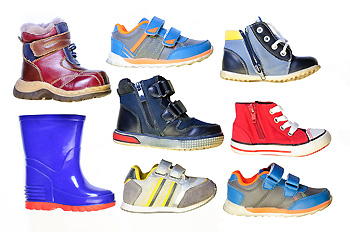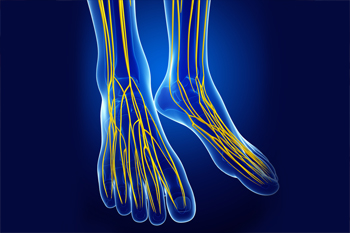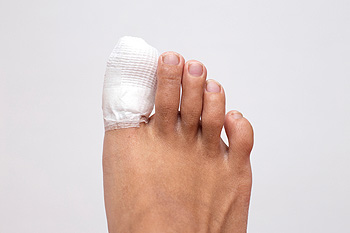Connect With Us
Blog
Can Cracked Heels Be Prevented?
 The foot condition known as cracked heels can develop for several reasons. These can include a vitamin deficiency, being overweight, and certain fungal conditions. Additionally, people who are diabetic may be more likely to experience cracked heels. This may be a result from a lack of circulation that can often accompany diabetes. Fissures, which are deep cracks in the skin, can cause significant pain and discomfort. Relief may be found when shoes that are worn have a closed back. Additionally, patients have found their skin may soften when a good moisturizer is applied, and it may help to avoid being barefoot. Drinking plenty of fresh water daily may help to reduce the risk of developing cracked heels. If you would like more information about how to prevent the onset of cracked heels, please confer with a podiatrist who can provide you with proper knowledge.
The foot condition known as cracked heels can develop for several reasons. These can include a vitamin deficiency, being overweight, and certain fungal conditions. Additionally, people who are diabetic may be more likely to experience cracked heels. This may be a result from a lack of circulation that can often accompany diabetes. Fissures, which are deep cracks in the skin, can cause significant pain and discomfort. Relief may be found when shoes that are worn have a closed back. Additionally, patients have found their skin may soften when a good moisturizer is applied, and it may help to avoid being barefoot. Drinking plenty of fresh water daily may help to reduce the risk of developing cracked heels. If you would like more information about how to prevent the onset of cracked heels, please confer with a podiatrist who can provide you with proper knowledge.
Cracked heels are unsightly and can cause further damage to your shoes and feet. If you have any concerns, contact one of our podiatrists from Foot & Ankle Associates of Maine. Our doctors can provide the care you need to keep you pain-free and on your feet.
Cracked Heels
Cracked heels appear unappealing and can make it harder for you walk around in sandals. Aside from looking unpleasant, cracked heels can also tear stockings, socks, and wear out your shoes. There are several methods to help restore a cracked heel and prevent further damage.
How Do You Get Them?
Dry skin is the number one culprit in creating cracked heels. Many athletes, walkers, joggers, and even swimmers suffer from cracked heels. Age and skin oil production play a role to getting cracked heels as well.
Promote Healing
Over the counter medicines can help, especially for those that need instant relief or who suffer from chronic dry feet.
Wear Socks – Wearing socks with medicated creams helps lock in moisture.
Moisturizers – Applying both day and night will help alleviate dryness which causes cracking.
Pumice Stones – These exfoliate and remove dead skin, which allows for smoother moisturizer application and better absorption into the skin.
Change in Diet
Eating healthy with a well-balanced diet will give the skin a fresh and radiant look. Your body responds to the kinds of food you ingest. Omega-3 fatty acids and zinc supplements can also revitalize skin tissue.
Most importantly, seek professional help if unsure how to proceed in treating cracked heels. A podiatrist will help you with any questions or information needed.
If you have any questions, please feel free to contact our office located in Brunswick, ME . We offer the newest diagnostic and treatment technologies for all your foot care needs.
How to Choose Your Child’s Shoes
 Your child’s feet will grow very quickly in the first 5 years of their life. Proper footwear during this time is very important in order to allow the bones in the feet to grow straight. When your child is just a baby, the bones in the toes are very soft, and shoes and socks that are too tight can restrict these bones from growing properly. In fact, shoes are not necessary for children until they are walking on their own, and even then, they are only needed for walking outside. It is important to also make sure that your child’s shoes are fastened with either laces or Velcro in order to keep the heel from slipping out of the shoe. Parents who have further questions about what shoes their child should be wearing as they grow can consult with a podiatrist for further advice and recommendations.
Your child’s feet will grow very quickly in the first 5 years of their life. Proper footwear during this time is very important in order to allow the bones in the feet to grow straight. When your child is just a baby, the bones in the toes are very soft, and shoes and socks that are too tight can restrict these bones from growing properly. In fact, shoes are not necessary for children until they are walking on their own, and even then, they are only needed for walking outside. It is important to also make sure that your child’s shoes are fastened with either laces or Velcro in order to keep the heel from slipping out of the shoe. Parents who have further questions about what shoes their child should be wearing as they grow can consult with a podiatrist for further advice and recommendations.
Making sure that your children maintain good foot health is very important as they grow. If you have any questions, contact one of our podiatrists of Foot & Ankle Associates of Maine. Our doctors can provide the care you need to keep you pain-free and on your feet.
Keeping Children's Feet Healthy
Having healthy feet during childhood can help prevent medical problems later in life, namely in the back and legs. As children grow, their feet require different types of care. Here are some things to consider...
Although babies do not walk yet, it is still very important to take care of their feet.
Avoid putting tight shoes or socks on his or her feet.
Allow the baby to stretch and kick his or her feet to feel comfortable.
As a toddler, kids are now on the move and begin to develop differently. At this age, toddlers are getting a feel for walking, so don’t be alarmed if your toddler is unsteady or ‘walks funny’.
As your child gets older, it is important to teach them how to take care of their feet.
Show them proper hygiene to prevent infections such as fungus.
Be watchful for any pain or injury.
Have all injuries checked by a doctor as soon as possible.
Comfortable, protective shoes should always be worn, especially at play.
If you have any questions please feel free to contact our office located in Brunswick, ME . We offer the newest diagnostic and treatment technologies for all your foot and ankle needs.
What Are the Treatments for Tarsal Tunnel Syndrome?
 Tarsal tunnel syndrome is a condition caused by compression of the posterior tibial nerve, which runs through a canal near the heel and into the sole of the foot. When the posterior tibial nerve is compressed, symptoms such as foot and ankle pain, burning, tingling, and numbness can arise. This condition is typically treated through conservative methods. These include resting and icing the affected foot, taking over-the-counter pain medications, wearing orthotics, immobilizing the foot, physical therapy, and steroid injections. In severe cases where conservative treatments have failed, decompression surgery may be needed. To learn more about tarsal tunnel syndrome, please seek the care of a podiatrist.
Tarsal tunnel syndrome is a condition caused by compression of the posterior tibial nerve, which runs through a canal near the heel and into the sole of the foot. When the posterior tibial nerve is compressed, symptoms such as foot and ankle pain, burning, tingling, and numbness can arise. This condition is typically treated through conservative methods. These include resting and icing the affected foot, taking over-the-counter pain medications, wearing orthotics, immobilizing the foot, physical therapy, and steroid injections. In severe cases where conservative treatments have failed, decompression surgery may be needed. To learn more about tarsal tunnel syndrome, please seek the care of a podiatrist.
Tarsal tunnel syndrome can be very uncomfortable to live with. If you are experiencing tarsal tunnel syndrome, contact one of our podiatrists of Foot & Ankle Associates of Maine. Our doctors can provide the care you need to keep you pain-free and on your feet.
Tarsal Tunnel Syndrome
Tarsal tunnel syndrome, which can also be called tibial nerve dysfunction, is an uncommon condition of misfiring peripheral nerves in the foot. The tibial nerve is the peripheral nerve in the leg responsible for sensation and movement of the foot and calf muscles. In tarsal tunnel syndrome, the tibial nerve is damaged, causing problems with movement and feeling in the foot of the affected leg.
Common Cause of Tarsal Tunnel Syndrome
- Involves pressure or an injury, direct pressure on the tibial nerve for an extended period of time, sometimes caused by other body structures close by or near the knee.
- Diseases that damage nerves, including diabetes, may cause tarsal tunnel syndrome.
- At times, tarsal tunnel syndrome can appear without an obvious cause in some cases.
The Effects of Tarsal Tunnel Syndrome
- Different sensations, an afflicted person may experience pain, tingling, burning or other unusual sensations in the foot of the affected leg.
- The foot muscles, toes and ankle become weaker, and curling your toes or flexing your foot can become difficult.
- If condition worsens, infections and ulcers may develop on the foot that is experiencing the syndrome.
A physical exam of the leg can help identify the presence of tarsal tunnel syndrome. Medical tests, such as a nerve biopsy, are also used to diagnose the condition. Patients may receive physical therapy and prescriptive medication. In extreme cases, some may require surgery.
If you have any questions please feel free to contact our office located in Brunswick, ME . We offer the newest diagnostic and treatment technologies for all your foot and ankle needs.
Easing Broken Toe Pain
 Broken toes, while painful, are typically not serious and have a good prognosis, with most injuries healing within four to six weeks. In addition to pain, symptoms of a broken toe include swelling, bruising, and difficulty walking on the affected toe. Severe breaks, which may involve the bone sticking out at an angle, a visible deformity of the toe, or the bone breaking through the skin, should be treated by a medical professional immediately. A mild injury can be treated at home while you wait to see your podiatrist. If you suspect your toe may be broken, rest and elevate the affected foot on cushions, apply ice wrapped in a towel to the toe, and take over-the-counter medications to reduce pain and swelling. If symptoms do not improve within a few days, it is strongly suggested that you see a podiatrist as soon as possible.
Broken toes, while painful, are typically not serious and have a good prognosis, with most injuries healing within four to six weeks. In addition to pain, symptoms of a broken toe include swelling, bruising, and difficulty walking on the affected toe. Severe breaks, which may involve the bone sticking out at an angle, a visible deformity of the toe, or the bone breaking through the skin, should be treated by a medical professional immediately. A mild injury can be treated at home while you wait to see your podiatrist. If you suspect your toe may be broken, rest and elevate the affected foot on cushions, apply ice wrapped in a towel to the toe, and take over-the-counter medications to reduce pain and swelling. If symptoms do not improve within a few days, it is strongly suggested that you see a podiatrist as soon as possible.
A broken toe can be very painful and lead to complications if not properly fixed. If you have any concerns about your feet, contact one of our podiatrists from Foot & Ankle Associates of Maine. Our doctors will treat your foot and ankle needs.
What to Know About a Broken Toe
Although most people try to avoid foot trauma such as banging, stubbing, or dropping heavy objects on their feet, the unfortunate fact is that it is a common occurrence. Given the fact that toes are positioned in front of the feet, they typically sustain the brunt of such trauma. When trauma occurs to a toe, the result can be a painful break (fracture).
Symptoms of a Broken Toe
- Throbbing pain
- Swelling
- Bruising on the skin and toenail
- The inability to move the toe
- Toe appears crooked or disfigured
- Tingling or numbness in the toe
Generally, it is best to stay off of the injured toe with the affected foot elevated.
Severe toe fractures may be treated with a splint, cast, and in some cases, minor surgery. Due to its position and the pressure it endures with daily activity, future complications can occur if the big toe is not properly treated.
If you have any questions please feel free to contact our office located in Brunswick, ME . We offer the newest diagnostic and treatment technologies for all your foot and ankle needs.
